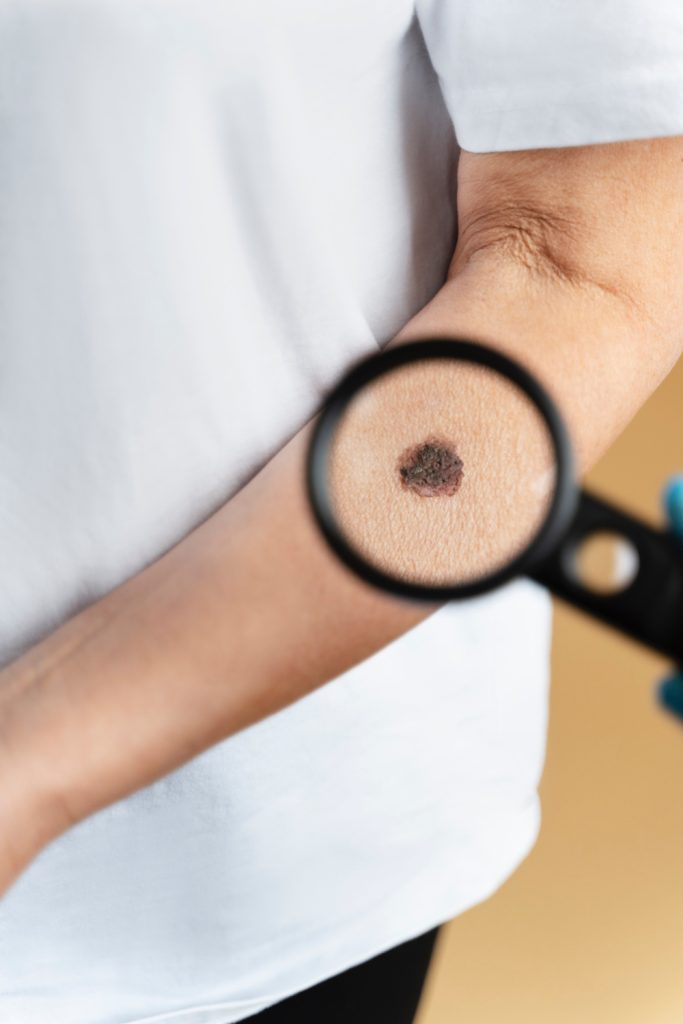Have a question about Aesthetics?
Me and my team will be happy to answer all your questions.
OTHER TREATMENTS
Skin cancer is the most common type of cancer in humans. The skin is an organ that creates our relationship with the outside world and covers a very large area. It is inevitable that various changes will occur in this wide area over time. Most of these changes (birthmarks, sun spots, benign tumors, etc.) are benign. However, some can also be malignant tumors. There has been a significant increase in malignant tumors in recent years due to the thinning of the ozone layer. However, the vast majority of skin tumors are treatable and do not cause health problems.
Prolonged exposure to the sun, genetic predisposition, light skin tone, prolonged exposure to certain chemicals, birthmarks on the body (nevus), wounds that do not close for a long time are among the most common causes of skin cancer.
Lying under the sun in the summer to get a tan is an activity that everyone loves. However, the damage caused by sun rays on the skin is also great. People with light skin color in particular should avoid the sun. The most important factor in skin tumors is sun rays. In addition, sun rays also cause premature skin aging. It is important to use protective creams when you are exposed to the sun’s rays.

You can’t tell the difference yourself. Sometimes even the experts in this work have difficulty distinguishing and may need to remove a piece of skin and have it examined in the laboratory. However, you can see a doctor if there is a stain or crust, the wound bleeds and it doesn’t heal within 3 to 4 weeks.
The spots and colored (pigmented) formations on the body are mostly harmless. Sometimes age-related or sun-related spots can appear. However, if you notice changes in existing or new birthmarks, contact your doctor. These changes are: birthmark growth in recent months; Limits that become irregular and asymmetrical; Emergence of color changes.
This is due to a completely wrong belief. If it is a malignant and untouched tumor, it will certainly spread. But if you have surgery, your chances of recovery are higher. Occasionally, skin tumors are considered benign by doctors who are not experts in the field, treated superficially, and the removed tissue is not even sent for examination. This unnamed tissue grows and spreads if it is not removed sufficiently. This led the public to believe: “The knife touched it and it spread”. It is a very wrong thought.
If there is a suspicion that the stain is a tumor, the only way to make a definitive diagnosis is to perform a pathological examination. If the stain is small enough to be treated (which is usually the case) when the area has been completely removed, it is best to remove everything and send it in for pathological examination. In this way, the pathologist who examines the tissue has the opportunity to make a better diagnosis, and in most cases, the diagnosis and treatment are carried out all at once. For larger stains, a piece from the lesion is sent in for inspection. The route of treatment is followed according to the pathology report received.
Yes it can. Such a possibility also depends on the type of tumor, but there is a possibility that it will recur. Most skin tumors occur especially in light-skinned people due to the effects of the sun. For this reason, some of the patients with skin tumors are removed and new tumors may appear in other regions with the same effects. Therefore, people who are operated on because of the skin tumor should be kept both with regard to the recurrence of the tumor, as well as the formation of new tumors and in follow-up.
Me and my team will be happy to answer all your questions.